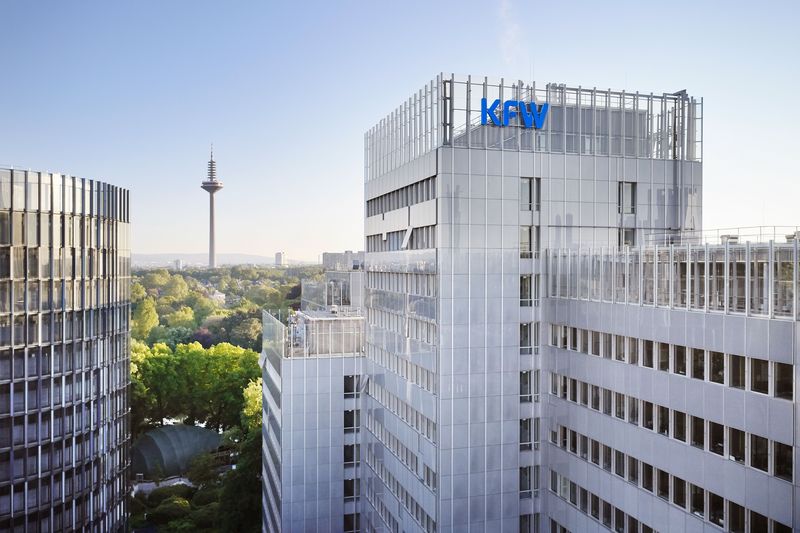Digital technology is set to revolutionise debt capital markets but realising its potential will only be achieved through the evolutionary process of experiment, learning and collaboration. KfW’s blockchain-based digital bond provided the latest test of Europe’s readiness for the digital transformation.
![]()
Digitalisation of financial markets brings the promise of greater levels of efficiency to the capital raising process, making transactions more secure, transparent and quicker – and faster flows of capital enhance growth prospects in the real economy. Its successful adoption has implications for the future competitiveness of the German and European financial markets and, consequently, the region’s economic prosperity.
That explains the importance with which KfW, the German state-owned promotional bank, is committed to playing a leading role in shaping the embryonic market for digital securities.
“Being a large and frequent bond issuer, we have a responsibility to the market in playing our part in determining the shape of the future capital raising world,” said Tim Armbruster, treasurer at KfW.
“And there’s a choice: you can either sit at the back of the innovation bus and let someone else determine the market’s direction, or you can sit at the front, look ahead through the windscreen for signposts to new opportunities, and drive.”
It is only possible to confidently navigate those new pathways by actively participating in the emerging technology and its application. As with any evolutionary process, experience, collaboration and learning are key.
“You can only progress by testing and by deriving evidence,” said Armbruster. “If you want to talk knowledgably about a subject, then you need to have the necessary technical know-how and relevant experience.”
That only comes with the implementation of concrete use cases.
CRYPTO DEBUT
On May 6, KfW announced plans to launch its debut blockchain-based digital bond on the Polygon blockchain.
It was not the first bond in the market to use distributed ledger technology – there have also been deals from issuers such as the EIB and Siemens – nor was it KfW’s first foray into the world of digital finance. In 2017, KfW had already conducted a simulation issuance of a commercial paper using DLT.
But it was primarily the passing of the German Electronic Securities Act (eWpG) in mid-2021 that proved instrumental in the development of digital securities in Germany as it provides the framework for issuing securities in purely electronic format without a physical certificate.
Some 18 months later, KfW issued a €20m bond in the form of a central register security on CSD Clearstream via Deutsche Boerse’s D7 platform, followed by another central register security, a €4bn benchmark bond in summer 2024.
The bank’s first blockchain-based digital bond, a €100m note due December 2025 priced on July 2 2024, was also the first syndicated crypto security issued in accordance with the eWpG in Germany. Paying a coupon of 3.125%, it was priced to yield 19.6bp over the 0% OBL due October 2025 and 10bp over KfW’s outstanding bond due in November 2025.
The transaction provided an opportunity to test processes under the new regulatory framework and, through the use of syndication, expand the size of the participating community.
“From the outset, our aim was to involve as many market participants as possible in order to understand where Germany stands in the development of the digital bond markets, get a feeling for how well the product is understood and gauge its potential for scalability,” said Armbruster. “The focus was thus on investor education and collective learning.”
A bookrunner consortium comprising DZ Bank, Deutsche Bank, LBBW and Bankhaus Metzler brought the deal to market. DZ Bank was also the collective registered holder for the bond while Deutsche Bank was lead arranger and settlement agent.
Frankfurt-based fintech Cashlink Technologies was the crypto securities registrar.
The eight-week period between announcement and pricing was intentional and significant as it allowed room for engagement.
The anchor investor was Union Investment. Already well versed in buying crypto securities, it assisted in the design of the KfW deal and engaged in the education of its bond investor peers.
“We set up a number of educational sessions supporting investors that were, at this point, not as familiar and ready to invest in this product,” said Christoph Hock, head of tokenisation & digital assets at Union Investment. “This made the time between announcement and pricing really important.”
Still, it wasn’t the right product for every bond investor.
LESSONS LEARNED
Major stumbling blocks restricting wider investor participation were ECB eligibility and illiquidity in the secondary market.
“The secondary market is still in the early phase of development,” said Tim Meirer, senior manager capital market innovation at KfW. “This is partly due to the modest number of issues and limited number of eligible investors. But it’s also regulatory.”
“There is a lack of a level playing field between crypto securities and traditional as well as central register securities when it comes to ECB eligibility,” said Meirer.
In order to trade on an exchange, securities must – among other aspects – be deposited with central securities depositories, but CSDs currently cannot undertake settlement of crypto securities. This impacts their liquidity and marketability since for securities to be used as collateral in Eurosystem credit operations, they must be readily tradeable at any time – something that can only be assured on a regulated marketplace.
“If a bond is not easy to sell and is not ECB-eligible, our investors tell us that digital securities are currently not as interesting to them as traditional financial products,” says Nils Christopeit, product manager, digital custody solution at DZ Bank.
“I think we’ve all learned what it takes to achieve a greater level of scalability through this exercise,” said Christopeit. “Investors have been able to clearly define what is required in order for them to buy these products in the future.”
That insight will be of great value in designing subsequent transactions that appeal to a wider investor base.
ROAD AHEAD
While KfW’s debut blockchain-based digital bond focused on the asset side and on expanding the universe of investors, its subsequent deal – a €50m 3.46% note with a three-month maturity, settled on August 28 2024 – addressed cash-on-chain. For the first time, blockchain technology was successfully used to process the transfer of central bank money.
With this latest bond, part of the ECB’s exploratory work on new technologies for processing DLT-based financial market transactions in central bank money, KfW tested the monetary processing of a blockchain-based digital bearer bond using the Deutsche Bundesbank’s Trigger Solution. Participants used DLT and smart contracts, which enabled the automated exchange of securities and payment amounts – delivery versus payment.
“Once we have cash-on-chain in addition to assets on chain, when we have secondary market trading, and suitable regulatory framework, then we are closer to reaching the goal of standardisation and scalability: faster execution, less operational risk, lower cost and more efficiency,” said Hock.
Reaching the scale to compete with a process that has been serving the market to an accepted level of efficiency will take time and will need to be developed in an atmosphere of collaboration and learning across all participants in the market: investors, issuers, intermediaries and regulators.
It is an iterative, evolutionary and necessary process, one that is essential in ensuring the financial markets of Germany and Europe remain competitive and for KfW to best serve its customers.
“We see our mission as helping the market for digital bonds grow,” said Armbruster. “One where we share our experiences and understanding with other market participants in shaping the digital development of the capital markets.”

Tim Armbruster
Treasurer KfW

Tim Meirer
Senior Manager Capital Market Innovation at KfW
SPONSORED ARTICLE BY KfW

